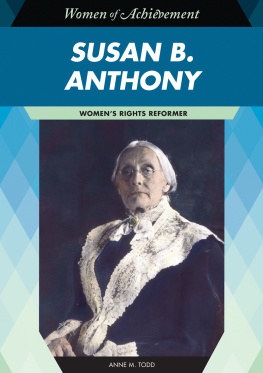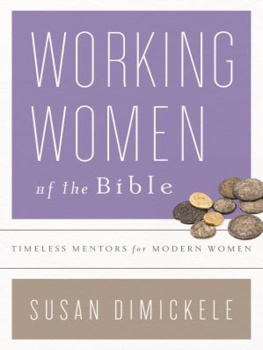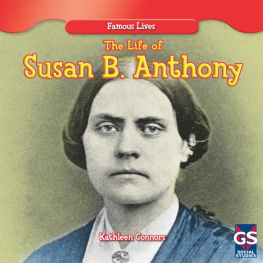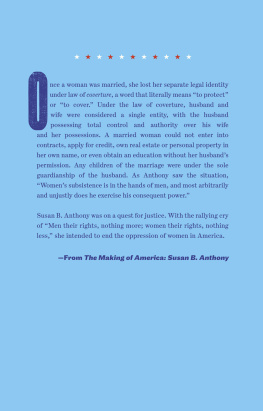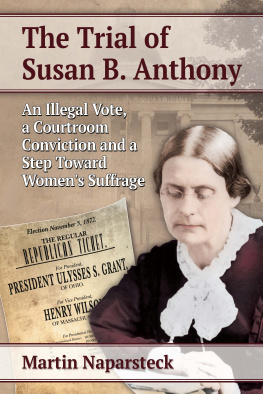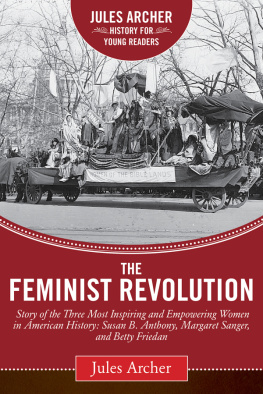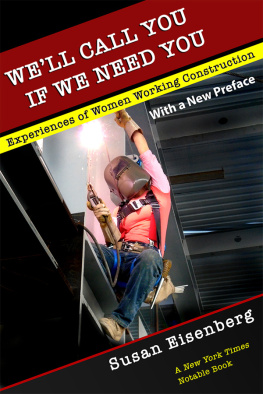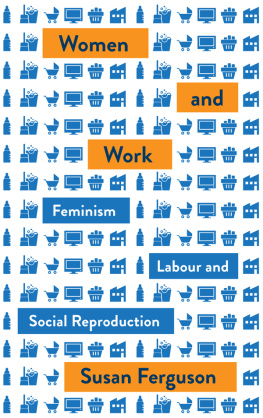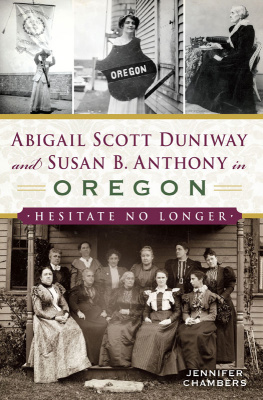Anne M. Todd - Susan B. Anthony: Activist
Here you can read online Anne M. Todd - Susan B. Anthony: Activist full text of the book (entire story) in english for free. Download pdf and epub, get meaning, cover and reviews about this ebook. year: 2014, publisher: Infobase Publishing, genre: Science fiction. Description of the work, (preface) as well as reviews are available. Best literature library LitArk.com created for fans of good reading and offers a wide selection of genres:
Romance novel
Science fiction
Adventure
Detective
Science
History
Home and family
Prose
Art
Politics
Computer
Non-fiction
Religion
Business
Children
Humor
Choose a favorite category and find really read worthwhile books. Enjoy immersion in the world of imagination, feel the emotions of the characters or learn something new for yourself, make an fascinating discovery.
- Book:Susan B. Anthony: Activist
- Author:
- Publisher:Infobase Publishing
- Genre:
- Year:2014
- Rating:5 / 5
- Favourites:Add to favourites
- Your mark:
- 100
- 1
- 2
- 3
- 4
- 5
Susan B. Anthony: Activist: summary, description and annotation
We offer to read an annotation, description, summary or preface (depends on what the author of the book "Susan B. Anthony: Activist" wrote himself). If you haven't found the necessary information about the book — write in the comments, we will try to find it.
Susan B. Anthony spent her life working to bring equality to women and African Americans. She wanted both groups to have the same educational opportunities, the same working
Susan B. Anthony: Activist — read online for free the complete book (whole text) full work
Below is the text of the book, divided by pages. System saving the place of the last page read, allows you to conveniently read the book "Susan B. Anthony: Activist" online for free, without having to search again every time where you left off. Put a bookmark, and you can go to the page where you finished reading at any time.
Font size:
Interval:
Bookmark:
Copyright 2014 by Infobase Learning
All rights reserved. No part of this publication may be reproduced or utilized in any form or by any means, electronic or mechanical, including photocopying, recording, or by any information storage or retrieval systems, without permission in writing from the publisher. For more information, contact:
Chelsea House
An imprint of Infobase Learning
132 West 31st Street
New York NY 10001
ISBN 978-1-4381-5315-5
You can find Chelsea House on the World Wide Web
at http://www.infobaselearning.com
"Friends and Fellow-citizens: I stand before you to-night, under indictment for the alleged crime of having voted at the last Presidential election, without having a lawful right to vote. It shall be my work this evening to prove to you that in thus voting, I not only committed no crime, but, instead, simply exercised my citizen's right, guaranteed to me and all United States citizens by the National Constitution, beyond the power of any State to deny."1
So began Susan B. Anthony's speech, entitled "Is It a Crime for a Citizen of the United States to Vote?" At that time in American history, in 1872, it was illegal for a woman to cast a ballot during an election in the United States. Anthony had already spent much of her life trying to change that law. She believed that, as citizens of the United States, women had the same rights as men. The U.S. government did not share her belief. Authorities arrested Anthony for an illegal vote in a federal election in November 1872.
Prior to the vote and her arrest, Anthony had managed to sway election officials in Rochester, New York, to allow her (and 15 other womenincluding Anthony's three sisters, Guelma, Hannah, and Mary) to register to vote. Anthony told the election officials that she was claiming their right to vote not under the Constitution of the State of New York, but rather under the Fourteenth Amendment of the Constitution of the United States. The Fourteenth Amendment, in part, says that all people born in the United States are citizens of the United States and are entitled to the privileges of citizenship; Anthony believed that those privileges included voting. After discussion, the officials allowed the women to register.
Four days later, Anthony cast the only presidential ballot she would make in her lifetime: She voted for Republican Ulysses S. Grant. Anthony described her decision to vote this way: "I voted in the State of New York in 1872 under the construction of [the Fourteenth and Fifteenth] amendments, which we felt to be the true one, that all persons born in the United States, or any State thereof, and under the jurisdiction of the United States, were citizens, and entitled to equality of rights, and that no State could deprive them of their equality of rights."2
A few weeks later, on Thanksgiving Day, a U.S. marshal came to Anthony's red brick home, located on Madison Street in Rochester, New York, and arrested her. Her bail was set at $1,000. Anthony's attorney paid the bail money, and Anthony immediately set out to deliver her speech, "Is It a Crime for a Citizen of the United States to Vote?" She did so for the next three weeks, traveling to 29 of the towns and villages in Monroe County and 21 towns in Ontario County. In each town, people gathered to hear Anthony speak out about the injustice of her arrest and why women should have voting rights.
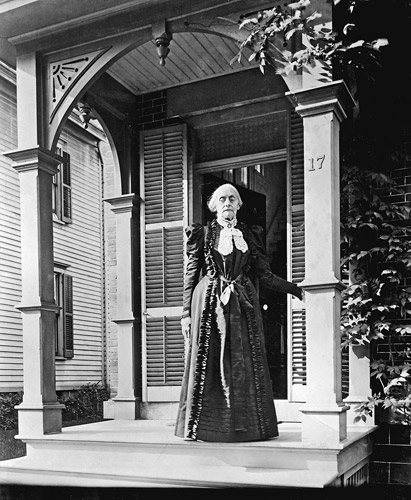
Women's rights activist Susan B. Anthony stands on the porch of her family's home at 17 Madison Street in Rochester, New York, in the 1870s. U.S. marshals came to the home in November 1872 to arrest her for voting in the presidential election. It was the only presidential election in which Anthony would ever participate.
Source: Corbis.
The following summer, on June 17, 1873, Anthony's trial began at the U.S. Circuit Court in Canandaigua, New York. Yet Judge Ward Hunt had made his decision about the case long before setting foot in the courtroom. Hunt instructed the 12 male jurors to find Susan B. Anthony guilty. He said to them, "The question, gentlemen of the jury is wholly a question or questions of law, and I have decided as a question of law, in the first place, that under the Fourteenth Amendment, which Miss Anthony claims protects her, she was not protected in a right to vote. And I have decided also that her belief and the advice which she took do not protect her in the act which she committed. If I am right in this, the result must be a verdict on your part of guilty, and I therefore direct that you find a verdict of guilty."3 The jury obliged. When Anthony had earlier tried to testify in her own defense, Hunt had barred her from taking the stand.
After the verdict, Anthony was finally allowed to speak, but Judge Hunt frequently interrupted her and cut her off, insisting that "the court cannot allow the prisoner to go on."4 When he later told Anthony that she had been tried according to the established forms of law, she responded, "Yes, your honor, but by forms of law all made by men, interpreted by men, administered by men, in favor of men, and against women; and hence, your honor's ordered verdict of guilty, against a United States citizen for the exercise of 'that citizen's right to vote,' simply because that citizen was a woman and not a man."5
Anthony's words fell to deaf ears. Judge Hunt ordered Susan B. Anthony to pay a $100 fine for her crime. She never paid it.
- 1. "Address of Susan B. Anthony." Available online at http://www.law.umkc.edu/faculty/projects/ftrials/.
- 2. James Daley, editor, Great Speeches by American Women. Mineola, N.Y.: Dover Publications, 2008, p. 14.
- 3. Lynn Sherr, Failure Is Impossible: Susan B. Anthony in Her Own Words. New York: Random House, 1995, p. 115.
- 4. Ibid., p. 116.
- 5. Ibid., p. 116.
Susan Brownell Anthony was born on February 15, 1820, in the rural town of Adams, Massachusetts. Her father, Daniel Anthony, had been raised a Quaker. Quakers are the Religious Society of Friends, which had originated in the mid-1600s in England. Quakers have strict ideals by which they live. They are quiet and somberno loud voices or singing. They dress mostly in graysno colorful or frilly garb. Quakers do not believe that priests or places of worship are necessary to have a relationship with God. Instead, Quakers believe that every person has an "inner light" that is able to direct them to divine truth. Quakers were one of the first organized groups to practice complete equality between men and women. Quakers also do not believe in war (armed conflict) or slavery.
Susan's mother, Lucy Read, had been raised a Baptist. Baptists do gather at a church to listen to sermons and pray. Lucy had liked to sing and dance and wear brightly colored clothes. The Anthonys and the Reads, both farming families, were neighbors. Living next door to each other, Daniel and Lucy became fast childhood friends and remained so as they grew up together. In his teenage years, Daniel left Adams to attend school. When he returned, he and Lucy soon discovered that their friendship had turned into love. Daniel loved Lucy's zeal for life and happy nature. Eager to begin a life together, they got married. The young couple, however, did not take the time to obtain official Quaker approval of the marriage, and a scandal resulted.
Daniel's formal apology to the congregation stated that "I am sorry that in order to marry the woman I love best, I had to violate a rule of the religious society I revered the most."1 The Society accepted his apology, and Daniel was able to regain his status within the community. Lucy felt badly about the Quakers' reaction to the marriage, and she became withdrawn and quiet. And although Lucy took on the ways of the Quakersno longer singing and dancing or wearing bright clothingshe never became a Quaker herself. Daniel and Lucy loved each other deeply and tried to make the best of the situation. In her biography of Susan B. Anthony, Kathleen Barry notes that "Lucy Anthony learned to be pious and humble as a young bride, and soon she would pass these virtues on to her daughters."2
Font size:
Interval:
Bookmark:
Similar books «Susan B. Anthony: Activist»
Look at similar books to Susan B. Anthony: Activist. We have selected literature similar in name and meaning in the hope of providing readers with more options to find new, interesting, not yet read works.
Discussion, reviews of the book Susan B. Anthony: Activist and just readers' own opinions. Leave your comments, write what you think about the work, its meaning or the main characters. Specify what exactly you liked and what you didn't like, and why you think so.

